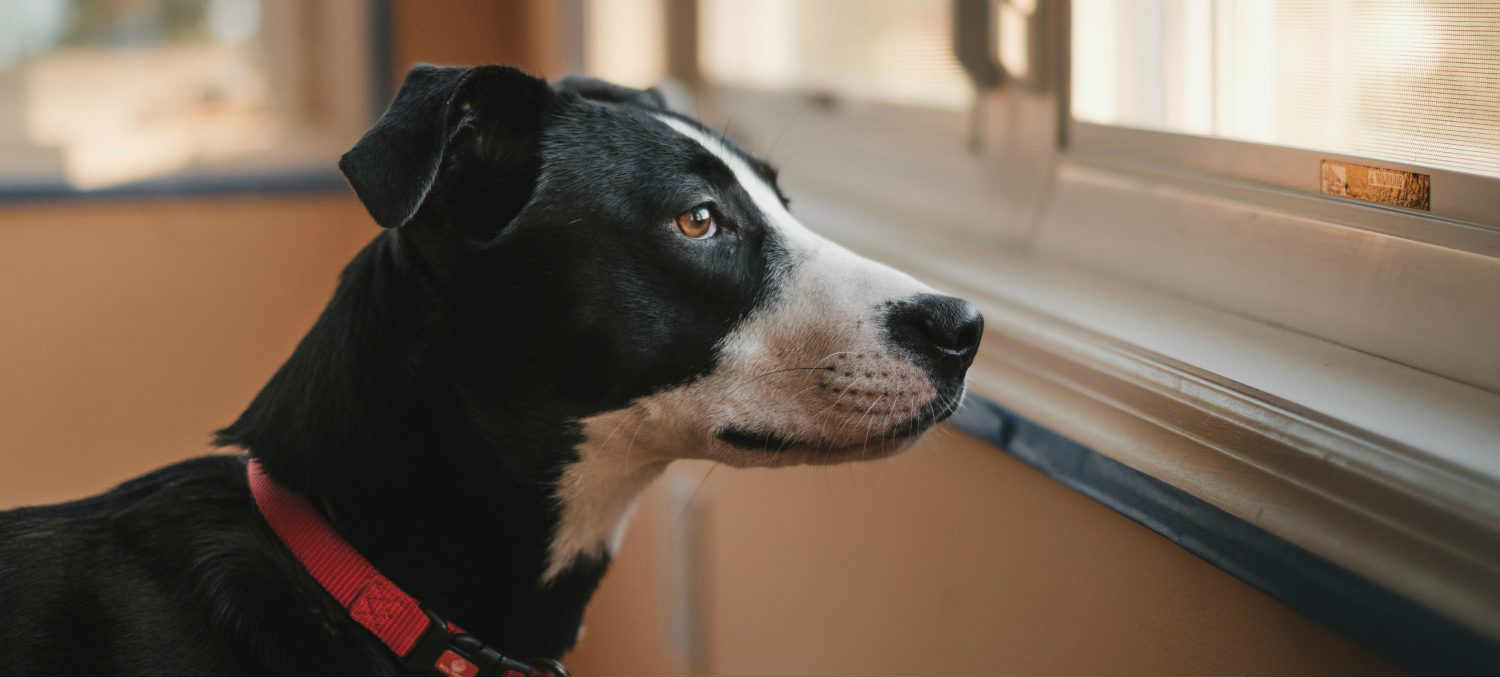What are some tips on how to help a dog with separation anxiety?
Original Question: Dr. Greenway we have a 2.5-year-old Great Dane/Lab mix. He came to us through Niagara rescue about 10 months ago from West Virginia. He originally was born and lived on a working farm but he had to be given up as he went after the farm animals. He took to us immediately and fit in well into our household. He is walked 1/2 hour in the morning before breakfast, at noon and again in the evening. He has been a good dog, very low key but needy; always wanting to be near us and of course wants petting and then eventually lies down. in the past few weeks he has started to display severe symptoms of anxiety when left alone (panting, drooling, pacing) . Previously he’d just lay down on his dog bed when we left the house. We never make a fuss upon leaving or returning. He is starting to damage the house as he tries to chew his way out of the doorway. He is not left hours on end, even an hour sends him into a tizzy. We tried to crate him from day one. I have a large metal crate that I put him in and secured all the doors. We have no idea but he some how got out without even opening the doors. Then we bought a Vari Kennel, the large plastic one and he refused to get in. We tried enticing him, first with feeding him in there without the lid, but soon as the top was put on he would not go in. He is approximately100 lb. dog so physically forcing him in is out of the question. any advice or suggestions would be greatly appreciated. - Eva
 May 16, 2018
May 16, 2018
Hi Eva,
I can’t say why canine separation anxiety has developed in your dog and by the content of your question, I assume you aren’t aware of any stressful events in the past that could have prompted this. The first thing I would recommend is for you to visit your veterinarian and have a physical examination and wellness testing performed. We want to make sure there is not an underlying medical condition that could be contributing to this issue. An example may be that arthritis has developed, which has lead to weakness and frequent slipping on hardwood floors. This can make the house seem really scary and would make sense for the problem to just slowly appear when it wasn’t there before. Another possibility is that there is a source of pain which is causing distress. So I would strongly suggest that you rule out any medical conditions.
If there is no medical basis for it, then there are a few ways to deal with separation anxiety in dogs. There’s the really long way and the really short way. It is vital to work with your veterinarian or a veterinary behaviorist to achieve success when treating this condition.
The long way is doing something called desensitization and counter conditioning therapy. You can look this up on websites and YouTube for examples of how to do this. Desensitization means exposing him to the anxiety-creating stimulus in small doses, such as leaving him for 30 seconds, then 60 seconds, then longer and longer each time. For instance, your dog will start to get anxious when you get your jacket on and while you grab your keys and put your shoes on. You can do all of these things and then sit on the couch and watch TV for an evening. The anxiety that these cues cause will become diminished because they don’t necessarily mean that you’ll be leaving your dog on its own anymore. Counter conditioning means giving him treats and praise while exposing him to the anxiety-creating stimulus so that he is happy in these moments rather than anxious. For example, you can feed a treat as you walk out the door and then 5 seconds later, come back in, take off your jacket and shoes, and stay home. Keep doing these things more often and for longer periods of time until their anxiety-creating effect is diminished.
Reading this, you can see how difficult this could be given the type of scenario you’re dealing with. This is why this is such a challenging way to affect behavior change.
The other way is giving him an anti-anxiety medication. There are medications that help tremendously in most cases and are very safe. If the anxiety is ever present or daily, such as separation anxiety from you leaving him alone in the house, it works really well. If the anxiety is very acute and intense, such as fear when another dog approaches him, thunderstorms, or leaving him in specific circumstances, it is not as effective. I try not to recommend drugs for behavioral modification because most people have a natural unease with this plan, but in cases where the anxiety is really impacting your dog’s quality of life in a negative way, I think it is very important to consider.
Some people have requested sedatives, such as a drug called acepromazine, for very intense periods of anxiety, such as car/air travel, thunderstorms, nail trimmings, etc.
I hope this helps. Good luck.
Dr. Clayton Greenway


Disclaimer: healthcareforpets.com and its team of veterinarians and clinicians do not endorse any products, services, or recommended advice. All advice presented by our veterinarians, clinicians, tools, resources, etc is not meant to replace a regular physical exam and consultation with your primary veterinarian or other clinicians. We always encourage you to seek medical advice from your regular veterinarian.

